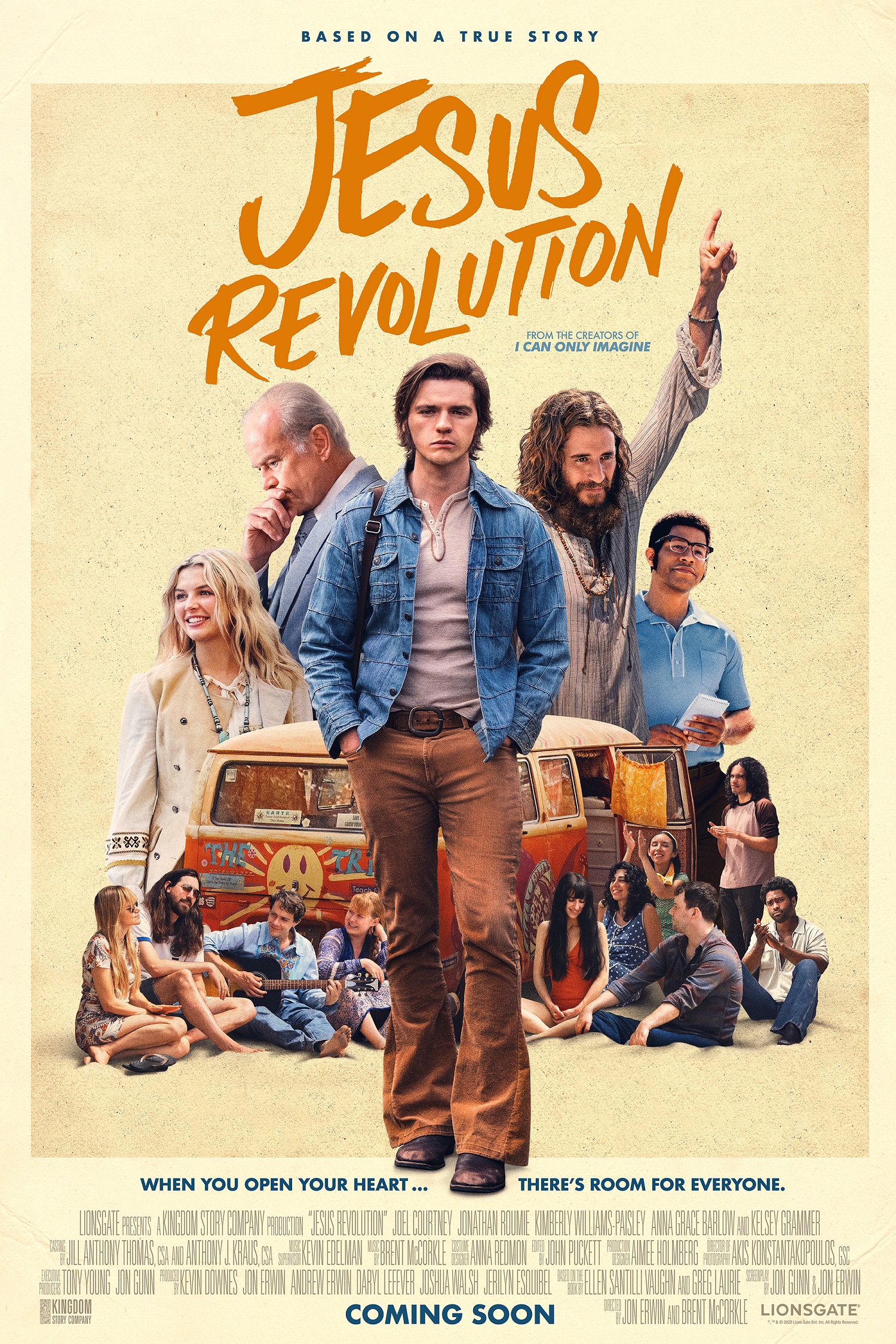Jesus Revolution
Jesus Revolution tells the story of a most unusual and unexpected joining of forces between a Christian church in California and the hippie movement. That union kicked off a phenomenon that eventually spread nationwide in the early 1970s. Jon Erwin (who co-directed with Brent McCorkle) touched on the occurrences in the excellent documentary The Jesus Music, but expands on it with this dramatization. The movie provides a fascinating look at how two separate, and very different, entities found common ground, using that to revitalize religion during the decade and giving birth to the so-called “Jesus freaks.”
Kelsey Grammer plays Chuck Smith, the preacher at Calvary Chapel, a church with a dwindling congregation. Through his more liberal-minded daughter, he meets Lonnie Frisbee (Jonathan Roumie), a hippie who has come to the conclusion that all the countercultural staples – free love, drugs, etc. – have failed to provide the meaning they initially promised. Worship, however, has proven to be deeply enlightening. He’s got a lot of hippie friends who feel similarly. Figuring the church could use butts in seats, Chuck overcomes initial trepidation, inviting Lonnie and his friends to start attending. This does not go over well with the more conservative parishioners, who reject these unkempt, shoeless intruders infiltrating their space. Nevertheless, he persists, scrapping the church organ for a folk/rock band and preaching in comfortable clothing rather than suits. The whole aura of his church evolves, with so many people wanting to get baptized that he has to start doing it right off the beach.
One of the new recruits is Greg Laurie (Joel Courtney), a straight-laced student who comes aboard after meeting and developing a crush on one of the hippies, Cathe (Anna Grace Barlow). His home life is a shambles, thanks to an alcoholic mother (Kimberly Williams-Paisley) who can barely keep herself together. Greg gets so much out of the church that, as Chuck begins to expand things, he expresses a desire to move up in the ranks.
Part of the strength of Jesus Revolution is that it’s a faith-based movie that doesn’t feel like a conventional faith-based movie. Because the story is true, it has the ability to avoid third-act miracles, overt preaching, and other conventions of the genre. In fact, anyone can enjoy the film, regardless of religious affiliation (or lack thereof), provided they want to see a dramatization of a pretty interesting event that actually happened in our country.
The best factor is how the picture shows the mutual need that brought these two parties together. Lonnie and the hippies are genuinely exploring their faith in Christ, but they need a formal structure to maximize their efforts. Chuck realizes that, as a pastor, his job is to bring people to the church. Welcoming this group – no matter how unorthodox – is perfectly fitting with this role. With that in place, we watch how the movement grows. The ‘60s were a turbulent time; therefore, a lot of folks were looking for a way to process that and move forward more positively. Chuck, and later Greg, take the attitude that everyone is welcome in the church, no matter what their background or status in life. That attitude meshes surprisingly well with the “peace and love” vibe embraced by the hippies. Erwin and McCorkle handle this effectively, taking time to go into detail on how everybody warmed up to everybody else, and how the compassionate nature of the message evoked a widespread reaction.
Performances in the movie are very good. Kelsey Grammer is perfect as Chuck Smith, nicely conveying how the initial resistance to Lonnie and crew softens as he begins to think it through. Even when the character isn’t speaking, we can see the wheels turning inside. Jonathan Roumie is also terrific in a tricky role. Lapsing into stereotype is easy when playing a hippie. The actor avoids that trap, making Lonnie a sincerely devout person on a quest for fulfillment in a complicated world. He also gets some of the film’s biggest laughs with his spot-on comedic timing. (Yes, it has a wonderful sense of humor.) As Greg, Joel Courtney captures the enthusiasm of the young, specifically the way this guy’s ambitions are unlocked by his association with Chuck and Lonnie.
For as many elements as it gets right, there are a few minor stumbles. The subplot involving Greg’s mother is a little underdeveloped, demonstrated mostly through a one-note “drunken parent” arc. Nothing against Williams-Paisley, who is fine. The writing here is merely a tad thin. A third-act change in Lonnie’s personality could similarly have been explored more fully. His presence begins to overshadow everyone else, leading to tension, although the reasons for that are relatively hazy.
Jesus Revolution is an informative and entertaining look at how a most unlikely collaboration changed the face of Christianity in America, at least for a time. It made me feel uplifted. It also made me feel just a bit sad. Both the late Chuck Smith and the still-preaching Greg Laurie eventually abandoned their “love everyone” approach. The former claimed the 9/11 attacks were partially a result of God’s anger toward homosexuality, whereas the latter has come down fairly hard on the LGBTQ+ community. Some of that is doubtlessly due to the increased politicization of Christianity that we’ve seen over the past two decades. Disappointing, nonetheless. Then again, Jesus Revolution is about the power of optimism in Christianity. Maybe, with a little luck, it will inspire more people to get back to that.
out of four
Jesus Revolution is rated PG-13 for strong drug content involving teens and some thematic elements. The running time is 2 hours.
